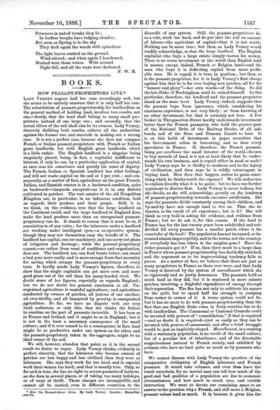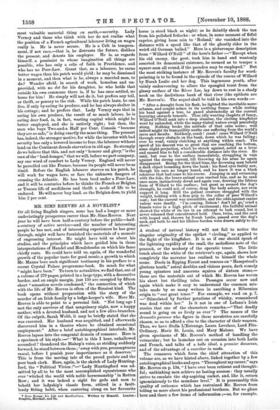BOOKS.
HOW PEASANT-PROPRIETORS LITE.*
LADY VERNEY argues half her case exceedingly well, but she seems to be entirely unaware that it is only half her case. The substitution of peasant-proprietorship for landlordism as the general method of holding land, involves two results, not one,—firstly, that the land shall belong to many small pro- prietors, instead of one large one ; and secondly, that the actual tillers of the soil shall also be its owners. Lady Verney, sinerely disliking both results, collects all the authorities against the former one and succeeds in making out a strong ease. It is not a perfect case, because she does not compare French or Italian peasant-proprietors with French or Italian great landlords, but with English great landlords, which is a little unfair. The English landlord is a singular being singularly placed, being, in fact, a capitalist indifferent to interest, if only he can, by a particular application of capital, at once ease his conscience and gratify his sense of dignity. The French, Italian, or Spanish landlord has other feelings, and will not waste capital on the soil at 2 per cent.; and con- sequently, as a matter of fact, agriculture on the great French, Italian, and Spanish estates is in a, backward condition, quite as backward—vineyards excepted—as it is in any district cultivated in patches. The vast estates of the old Neapolitan Kingdom are, in particular, in an infamous condition, both AS regards their produce and their people. Still, it is, we think, on the evidence, true that the large landlord on the Continent could, and the large landlord in England does, make the land produce more than an unorganised peasant- proprietary can do. It stands to reason that it must be so, if association is of any value ; for the labourers under a landlord are working under intelligent eyes,—a- co-operative system, though they may not themselves reap the benefit of it. The landlord has capital, can use machinery, and can carry out plans of irrigation and drainage ; while the peasant-proprietary oannot,—or rather, from want of confidence and organisation, does not. The landlord, too, can feed beasts better, can stand .a bad year more easily, and is more exempt from that necessity for saving which cramps the peasant-proprietary at every -turn. It hardly needs Lady Vern.ey's figures, therefore, to ;show that the single capitalist can get more corn and more good grass out of the soil than his many-headed rival. We -doubt some of her figures, especially as regards England ; but we do not doubt her general conclusion at all. Un- organised agriculture is wasteful agriculture; and agriculture .conducted by owners of patches, all jealous of one another, all over-thrifty, and all hampered by poverty, is unorganised :agriculture. So far, we have no dispute with our very lucid authoress, or only this, that she thinks the failure to combine on the part of peasants incurable. It has been so in France and Ireland, and it might be so in England; but it is not in the least a necessary consequence of the small culture; and if it ever ceased to be a consequence in fact, land might be as productive under one system as the other, and -the peasant-proprietary, taken in the aggregate, might be an ideal owner of the soil.
We will, however, abandon that point, as it is the second result we desire to argue. Lady Verney thinks, evidently in perfect sincerity, that the labourers who become owners of -patches are less happy and less civilised than they were as labourers. She says they work far too hard, and in especial work their women too hard; and that is usually true. Only, so far as it is true, she has no right to accuse peasants of laziness, as she does in several places, or of taking too many holidays, -or of want of thrift. Those charges are incompatible, and cannot all be carried, even in different countries, to the
* HOW ti,. Peasant-Choter Lives, By Lady Verney. London : Macmillan ‘and Co. discredit of any system. Still, the peasant-proprietors do, as a rule, work too hard, and do put into the soil an amount of labour—the equivalent of capital—that it is not worth. Nothing can be more true; but then, as Lady Verney would readily acknowledge, so does the large landlord. The English capitalist who buys a large estate simply wastes his money. There is no worse investment in the world than English land in masses, except, indeed, French or Belgian land—and the man who buys it is deflecting capital from more profit- able uses. He is repaid, it is true, in position ; but then, so is the peasant-proprietor, for it is Lady Verney's first charge against him that he is for ever buying new patches, all for the "honour and glory"—her own words—of the thing. So did the late Duke of Buckingham until he rained himself. In this particular, therefore, the landlord and the peasant-proprietor stand on the same level. Lady Verney, indeed, suggests that the peasant buys from ignorance, which, considering his enormous experience, is not very likely; or from knowing of no other investment, but that is certainly not true. A Jew broker in Throgmorton Street hardly understands investment better than the French peasantry, who hold the greater part of the National Debt, of the Railway Stacks, of all safe bonds, and of the Suez and Panama Canals to boot. It is on this habit of investment in paper securities that his Government relies in borrowing, and so does every speculator in France. If, therefore, the French peasant, being par excellence the small investor of the world, chooses to buy morsels of land, is it not at least likely that he under- stands his own business, and is repaid either in meal or malt ? Lady Verney says he is thrifty to madness and to the injury of civilisation, and then says he is wildly extravagant in buying land. How does that happen, unless he gains some- thing which he thinks worth the expense P • We will endeavour to explain directly what it is he gains; but we have one further argument to discuss first. Lady Verney is never tedious, but she dwells, as she will acknowledge, greatly on the tendency of peasant-proprietorship towards excessive subdivision. She says the peasants divide constantly among their children, and by-and-by have not enough land to live on. This, she in- timates, is the result of all experience; but is it? She will think us very bold in asking for evidence, and evidence from France; but we do ask it, for this reason. If the land in France has for the last twenty years been subdivided and sub- divided till every peasant has a smaller patch, whose is the remainder of the land? The population has not increased, or in- creased almost imperceptibly, and in the towns, not the country. If everybody has less, where is the surplus gone? Have the richer peasants got it? If so, then there must be a large class in France whom peasant-proprietorship has decidedly enriched, and the argument as to its impoverishing tendency falls to pieces. As a matter of fact, we believe that there are just as many proprietors in France as there ever were, and that Lady Verney is deceived by the system of morcellement which she so vigorously and so justly denounces. The peasants hold as much land as they did, but it is scattered in more minute patches, involving a frightful expenditure of energy through their separation. The flea has not only to cultivate his square on the quilt, but to spend half his strength in jumping from corner to corner of it. A worse system could not be, but it has no more to do with peasant-proprietorship than the fact that one English Duke votes in forty counties has to do with landlordism. The Communal or Cantonal Councils could be invested with powers of "consolidation," if that is required —and no doubt it is required—just as easily as they can be invested with powers of assessment, and alter a brief struggle would be just as implicitly obeyed. Morcellement, in a country with a stationary population, is no result of the small culture, but of a peculiar law of inheritance, and of the detestable suspiciousness natural to French society, and exhibited by artisans who have no land quite as much as by peasants who have.
We cannot discuss with Lady Verney the question of the comparative civilisation of English labourers and French peasants. It would take volumes, and even then leave the result uncertain, for no mortal man can tell how much of the good and bad qualities of a population are due to economic circumstances, and how much to creed, race, and outside instruction. We want to devote our remaining space to an answer to the question why a French, and still more a Belgian, peasant values land so much. It is because it gives him the
most valuable material thing on earth,—security. Lady Verney and those who think with her do not realise what the position of a French agricultural labourer living on wages really is. He is never secure. He is a Celt in tempera- ment, if not race,—that is, he distrusts the future, dislikes the present, and detests his employer. He is, as regards himself, a pessimist to whose imagination all things are possible, who has only a relic of faith in Providence, and who has no Poor-Law. Grant that, as a labourer, he earns better wages than his patch would yield : he may be dismissed in a moment, and then what is he, always a married man, to do P Wander afield, in search of work, homeless and un- provided, with no dot for his daughter, he who holds that outside his own commune there is, if he has once settled, no home for him! He simply will not do it, but prefers any toil, or thrift, or penury to the risk. While his patch lasts, he can live, if only by eating its produce, and he has always shelter in his cottage; and he prefers that. Lady Verney says that in eating his own produce, the result of so much labour, he is eating dear food, is, in fact, wasting capital which might be better employed, and she is entirely right; but then, the man who buys Two-and-a Half per Cent. Consols "because they are so safe," is doing exactly the same thing. The peasant has, indeed, the stronger motive, for while the investor with bad security has only a lowered income to fear, the labourer without land on the Continent dreads starvation in old age. So strongly do we believe that this, and not only " honour and glory," is the root of the" land-hunger," that we will, before we part company, say one word of comfort to Lady Verney. England will never be parcelled out like France, because its people will never be Bp timid. Before the English labourer starves on his patch, he will work for wages here, or face the unknown dangers of crossing the Atlantic. He has been bred under a Poor-Law, and it will be centuries before he thinks the French or Belgian or Tuscan life of sordidness and thrift a mode of life to be endured. He will never buy land, as the Belgian does, to yield him 2 per cent.







































 Previous page
Previous page